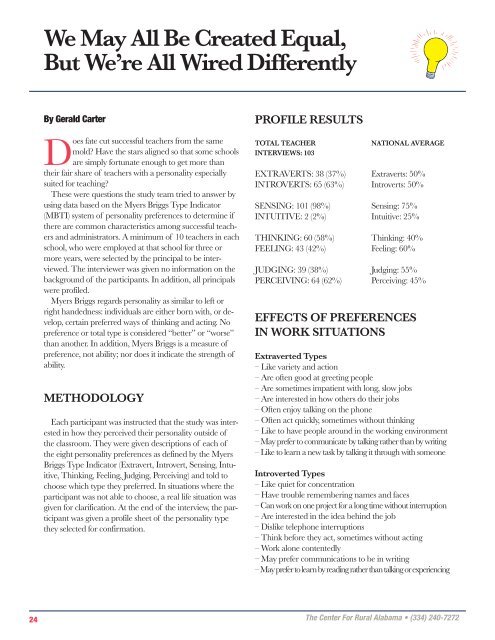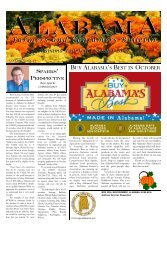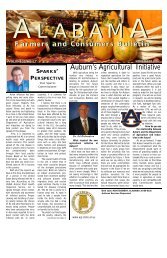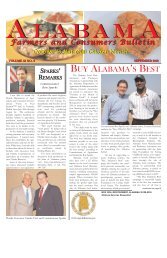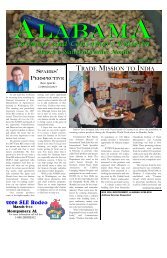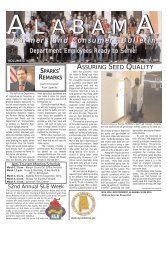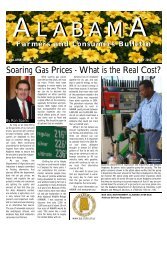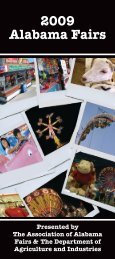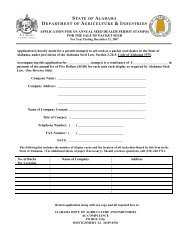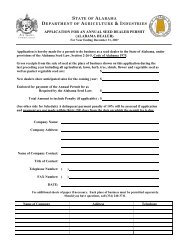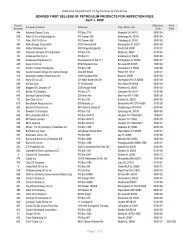Lessons Learned from Rural Schools - Alabama Department of ...
Lessons Learned from Rural Schools - Alabama Department of ...
Lessons Learned from Rural Schools - Alabama Department of ...
Create successful ePaper yourself
Turn your PDF publications into a flip-book with our unique Google optimized e-Paper software.
LLS-0010 <strong>Lessons</strong> <strong>Learned</strong>_Pub.qrk: 4/25/09 3:02 PM Page 24<br />
24<br />
We May All Be Created Equal,<br />
But We’re All Wired Differently<br />
By Gerald Carter<br />
Does fate cut successful teachers <strong>from</strong> the same<br />
mold? Have the stars aligned so that some schools<br />
are simply fortunate enough to get more than<br />
their fair share <strong>of</strong> teachers with a personality especially<br />
suited for teaching?<br />
These were questions the study team tried to answer by<br />
using data based on the Myers Briggs Type Indicator<br />
(MBTI) system <strong>of</strong> personality preferences to determine if<br />
there are common characteristics among successful teachers<br />
and administrators. A minimum <strong>of</strong> 10 teachers in each<br />
school, who were employed at that school for three or<br />
more years, were selected by the principal to be interviewed.<br />
The interviewer was given no information on the<br />
background <strong>of</strong> the participants. In addition, all principals<br />
were pr<strong>of</strong>iled.<br />
Myers Briggs regards personality as similar to left or<br />
right handedness: individuals are either born with, or develop,<br />
certain preferred ways <strong>of</strong> thinking and acting. No<br />
preference or total type is considered “better” or “worse”<br />
than another. In addition, Myers Briggs is a measure <strong>of</strong><br />
preference, not ability; nor does it indicate the strength <strong>of</strong><br />
ability.<br />
METHODOLOGY<br />
Each participant was instructed that the study was interested<br />
in how they perceived their personality outside <strong>of</strong><br />
the classroom. They were given descriptions <strong>of</strong> each <strong>of</strong><br />
the eight personality preferences as defined by the Myers<br />
Briggs Type Indicator (Extravert, Introvert, Sensing, Intuitive,<br />
Thinking, Feeling, Judging, Perceiving) and told to<br />
choose which type they preferred. In situations where the<br />
participant was not able to choose, a real life situation was<br />
given for clarification. At the end <strong>of</strong> the interview, the participant<br />
was given a pr<strong>of</strong>ile sheet <strong>of</strong> the personality type<br />
they selected for confirmation.<br />
PROFILE RESULTS<br />
TOTAL TEACHER NATIONAL AVERAGE<br />
INTERVIEWS: 103<br />
EXTRAVERTS: 38 (37%) Extraverts: 50%<br />
INTROVERTS: 65 (63%) Introverts: 50%<br />
SENSING: 101 (98%) Sensing: 75%<br />
INTUITIVE: 2 (2%) Intuitive: 25%<br />
THINKING: 60 (58%) Thinking: 40%<br />
FEELING: 43 (42%) Feeling: 60%<br />
JUDGING: 39 (38%) Judging: 55%<br />
PERCEIVING: 64 (62%) Perceiving: 45%<br />
EFFECTS OF PREFERENCES<br />
IN WORK SITUATIONS<br />
Extraverted Types<br />
– Like variety and action<br />
– Are <strong>of</strong>ten good at greeting people<br />
– Are sometimes impatient with long, slow jobs<br />
– Are interested in how others do their jobs<br />
– Often enjoy talking on the phone<br />
– Often act quickly, sometimes without thinking<br />
– Like to have people around in the working environment<br />
– May prefer to communicate by talking rather than by writing<br />
– Like to learn a new task by talking it through with someone<br />
Introverted Types<br />
– Like quiet for concentration<br />
– Have trouble remembering names and faces<br />
– Can work on one project for a long time without interruption<br />
– Are interested in the idea behind the job<br />
– Dislike telephone interruptions<br />
– Think before they act, sometimes without acting<br />
– Work alone contentedly<br />
– May prefer communications to be in writing<br />
–Mayprefertolearnbyreadingratherthantalkingorexperiencing<br />
The Center For <strong>Rural</strong> <strong>Alabama</strong> • (334) 240-7272


